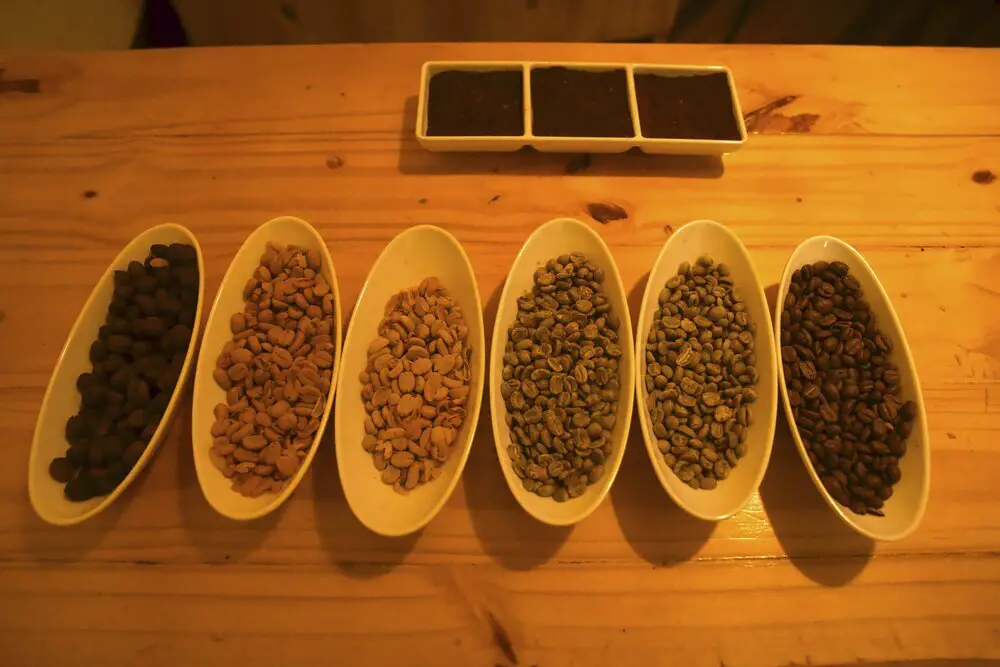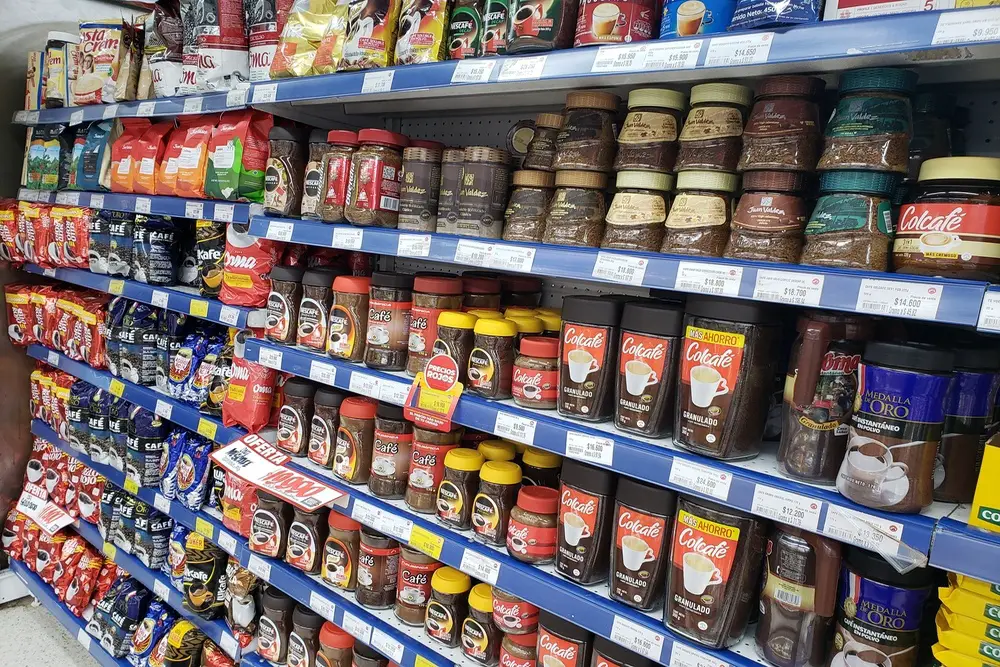Coffee is not only delicious to drink but also to eat! You may have thought of it or heard someone talk about coffee beans and enjoy them as a snack.
Table of Contents
What are coffee beans?
Before we get into how to consume coffee beans, we need to know what coffee beans are. Coffee beans are not only beans, but also seeds of fruits. These seeds are inside the coffee fruit. The slime that coats the seeds is removed when the coffee is processed for consumption.
Can you eat coffee beans?
The idea of eating coffee beans arose long before coffee was brewed and drunk. In the past, coffee beans were often mixed with animal fats and eaten as a snack for an energy boost.
There are several ways to eat coffee beans as a snack, mostly salted or dipped in chocolate. You may have seen chocolate-covered coffee beans on the shelves or counter in a store or coffee shop, which is the favorite way for many to enjoy coffee.
The interesting taste of coffee beans
Both green, unroasted coffee beans and roasted coffee beans can be consumed. Consuming unroasted coffee beans is safe, although they are harder to bite and chew because they are harder. Unroasted beans have an earthy, grassy flavor and are more acidic than roasted coffee beans.
The flavor of roasted coffee beans derives from their processing, which gives them their woody, nutty and smoky aromas, which also have fruity or spicy notes, depending on the type of bean.
The strong and robust taste with a slightly grainy texture, on the other hand, makes every coffee fan’s mouth water. However, the flavor depends on the type of roast of the beans, from light to dark, and the choice of roast determines how much flavor comes out in the coffee.
Typically, medium or dark roasts are more delicious and enjoyable for most people because they contain a stronger flavor and more oils.
Is Consuming Coffee Beans Healthy?
Unless you are allergic to coffee or its ingredients, coffee beans can be consumed without hesitation. However, one should always exercise moderation, as substances in large quantities can be harmful.
Benefits of eating coffee beans
In the scientific and nutritional world, it has been shown that coffee consumption in general has more positive than negative effects.
- Coffee beans provide a good amount of fiber.
- It may contain important ingredients to prevent type 2 diabetes.
- Coffee consumption is associated with improved cognitive function.
- It is also used to reduce the risk of depression in adults.
- It is rich in antioxidants, especially phenolic compounds.
- Coffee contains health-promoting substances such as vitamin B2, caffeine, cafestol, kahweol, chlorogenic acid, quinic acid and magnesium.
- Coffee consumption can help us feel more alert, sociable, focused, energetic, and productive.
- Some of these antioxidants are linked to the prevention of diseases like cardiovascular disease and inflammation.
Cons of eating coffee beans
As previously mentioned, coffee beans contain significant amounts of antioxidants and caffeine, which can have significant effects on our bodies.
For example:
- Too many coffee beans can lead to increased acidity in the stomach.
- Increased heart rate
- High consumption can have a laxative effect.
- Can lead to high cholesterol if consumed continuously.
- May cause sleep problems and/or nervousness.
How much caffeine is in coffee beans?
An Arabica coffee bean contains around 6 milligrams of caffeine, while a Robusta bean contains around 12 mg.
The effects of the caffeine in coffee beans are in a much stronger and more concentrated form. A normal serving of 28 coffee beans is comparable to a cup of black coffee (which can contain up to 200 milligrams of caffeine), which is up to 3.5 times the amount of caffeine.
How many coffee beans can you eat?
It’s safe to say that a serving of 15 to 30 a day is recommended, but if you are sensitive to caffeine or are pregnant you should reduce the serving to around half or a third of that and it’s always wise to check your dose beforehand to consult doctor.
According to the Mayo Clinic, the average person can safely consume up to 400 milligrams of caffeine, roughly the amount in 4 cups of coffee. That equates to about 8 ounces, which is the usual amount people serve themselves.
Coffee beans and pregnancy
You can consume coffee in general, but it is not recommended at this time. Several studies recommend or prescribe not consuming beverages with caffeine or other psychoactive substances during pregnancy.
Coffee and placenta
Caffeine can cross the placenta, which can affect the baby’s sleep and movement patterns because it is not fully metabolized by the fetus.
Coffee is a stimulant
Coffee usually increases heart rate and blood pressure (which should be avoided during pregnancy).
Some sources recommend no more than 200 milligrams of caffeine.
But in this case, you should think about your own well-being and that of your embryo.
Coffee and erections
A daily caffeine intake of 85 milligrams, or 43% of the average adult caffeine intake, may be enough to combat erectile dysfunction, according to the University of Texas Medical Center.
Chocolate covered coffee beans
Chocolate-coated coffee beans are sweet, roasted coffee beans that are usually coated with any type of chocolate: dark, milk, or white chocolate. Its sweetness is light, especially the dark chocolate and the taste of bitter coffee beans, which is normal for coffee drinkers.
How do I know if I’ve consumed too much caffeine?
The following symptoms can occur if you consume too much caffeine:
- Headache
- Nervousness
- mood swings
- Insomnia
- Palpitations
- Muscle tremors
Consuming too much caffeine on a regular basis can lead to liver damage, blood pressure damage, and even serious addiction.
Light or dark beans?
Medium or dark roasted beans may taste more pleasant (albeit greasy), but that comes down to personal preference.
As far as caffeine content goes, there is some debate as to which roast has more caffeine. The National Coffee Association reckon that lighter roasts have slightly higher caffeine levels and you can bet they know what they’re talking about when it comes to coffee!
Do Coffee Beans Help You Lose Weight?
When consumed in moderation and with no added sugar or sweeteners (yes, chocolate included), coffee beans can help you lose weight.
If you’re snacking on a handful of coffee beans instead of chips, popcorn, or chocolate, this substitute can save you some unnecessary extra calories.
Coffee beans contain no added fats, sugars and carbohydrates and only about 10 calories per serving. Additionally, it’s a great way to get the heart pumping and awaken the senses before a workout. It is very effective as many athletes or gym goers consume coffee beans in the morning before their workout.
This provides an extra boost of energy, useful before starting iron training or preparing for a busy day.
Conclusion
Coffee beans are edible, but should not be consumed in excess.
They’re high in antioxidants and caffeine, which can increase energy and reduce the risk of certain diseases. However, too much can cause unpleasant side effects. Even the chocolate-covered varieties can contain excess calories, sugar, and fat.
In moderation, however, coffee beans can be a safe and healthy way to get caffeine.



